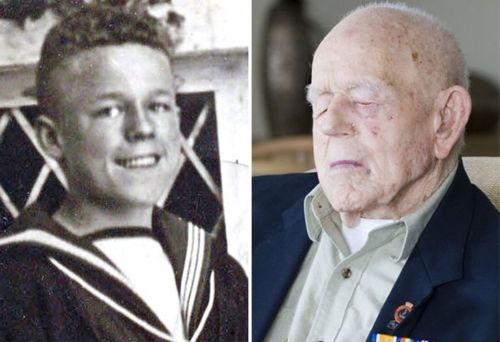Last World War I Combat Vet Dies at 110
By AP / KRISTEN GELINEAU

SYDNEY) — Claude Stanley Choules, the last known combat veteran of World War I, died in a Western Australia nursing home Thursday at age 110. And though his accomplishments were many — including a a 41-year military career that spanned two world wars — the man known as “Chuckles” to his comrades in the Australian Navy was happiest being known as a dedicated family man. “We all loved him,” his 84-year-old daughter Daphne Edinger told The Associated Press. “It’s going to be sad to think of him not being here any longer, but that’s the way things go.”
Choules was born March 3, 1901, in the small British town of Pershore, Worcestershire, one of seven children. As a child, he was told his mother had died — a lie meant to cover a more painful truth: She left when he was 5 to pursue an acting career. The abandonment affected him profoundly, said his other daughter, Anne Pow, and he grew up determined to create a happy home for his own children. ( See TIME’s photoessay “Peter van Agtmael’s Journey Through War.”)
In his autobiography, “The Last of the Last” published when he was 108, he remembered the day the first motor car drove through town, an event that brought all the villagers outside to watch. He remembered when a packet of cigarettes cost a penny. He remembered learning to surf off the coast of South Africa, and how strange he found it that black locals were forced to use a separate beach from whites.
He was drawn to the water at an early age, fishing and swimming at the local brook. Later in life, he would regularly swim in the warm waters off the Western Australia state coast, only stopping when he turned 100.
World War I was raging when Choules began training with the British Royal Navy, just one month after he turned 14. In 1917, he joined the battleship HMS Revenge, from which he watched the 1918 surrender of the German High Seas Fleet, the main battle fleet of the German Navy during the war. “There was no sign of fight left in the Germans as they came out of the mist at about 10 a.m.,” Choules wrote in his autobiography. The German flag, he recalled, was hauled down at sunset. “So ended the most momentous day in the annals of naval warfare,” he wrote. “A fleet of ships surrendered without firing a shot.”
Choules later joined the Royal Australian Navy and settled permanently Down Under, where he found life much more pleasant than in his home country. “I was nobody,” he told Australian Broadcasting Corp. radio in November 2009 of his years in England. “But I was somebody here.”
During World War II, he was the acting torpedo officer in Fremantle, Western Australia, and chief demolition officer for the western side of the Australian continent. Choules disposed of the first mine to wash ashore in Australia during the war.
He later transferred to the Naval Dockyard Police and remained in the service until his retirement in 1956. “His career has spanned some of the most significant events in maritime history,” Royal Australian Navy Captain Brett Wolski said in a statement Thursday.
But despite the fame his military service (and longevity) brought him, Choules later in life became a pacifist who was uncomfortable with anything that glorified war. He disagreed with the celebration of Anzac Day, Australia’s most important war memorial holiday, and refused to march in parades held each year to mark the holiday. “He didn’t believe in war,” Edinger said.
Choules and another Briton, Florence Green, became the war’s last known surviving service members after the death of American Frank Buckles in February, according to the Order of the First World War, a U.S.-based group that tracks veterans. Choules was the last known surviving combatant of the war. Green, who turned 110 in February, was a waitress in the Women’s Royal Air Force.